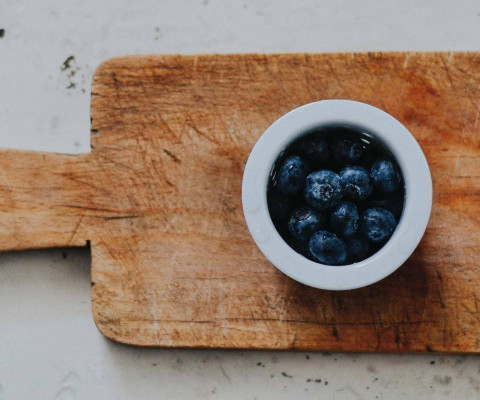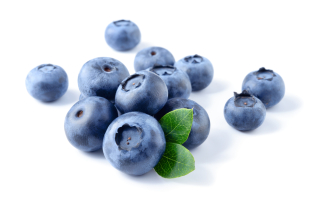
Blueberries
Blueberries pack a mighty health punch and helps with sports performance, energy levels and brain function. Wow!
- Be Healthier:
Blueberries are high in phytonutrients (especially Vitamin C and Manganese) which help in protecting against cancer and heart disease.
- Sharper Thinking:
Blueberries are high in flavonoids which have been shown to improve memory, enhance brain function and reduce rates of cognitive decline.
- Better Sports Performance:
Strenuous exercise is associated with oxidative stress / inflammation which results in muscle soreness, fatigue and impaired muscle soreness. The high phytonutrient content in blueberries helps reduce the oxidative stress to accelerate muscle recovery.
- More Energy:
Blueberries have a GI of around 53 which is low. This means that when they are digested, the carbohydrates in them are absorbed slowly resulting in a gradual release of glucose into the bloodstream. This helps to prolong energy throughout the day.
Blueberries are versatile and can be served for breakfast with rolled oats, as a snack, in a smoothie, as a dessert, added to a salad or mixed in with some Greek yogurt for a tangy and sweet sensation!

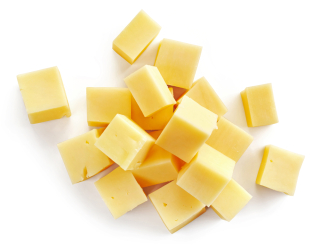
Cheese
You may not BRIE-lieve it, but eating moderate amounts of cheese regularly is consistent with good health! The Australian Guide To Healthy Eating recommends two to three serves of dairy foods per day with a serve equivalent to about 40 grams (about the size of a matchbox) of full fat or reduced fat cheese (*reduced fat is better to reduce your total kilojoule intake). Here are some reasons why cheese is awesome!
- Be Healthier:
A review of 4 studies found cheese intake to be associated with lower risk of heart disease.
- Better Sports Performance:
Cheese is high in protein which can provide amino acids for the maintenance and repair of muscle protein after strenuous exercise to help with a quicker recovery.
- Healthy Gut:
Cheese is a fermented food, containing bacteria or yeast, which contribute to healthy microbiomes and ultimately a healthy gut.
So we can all enjoy our Vegemite and cheddar sandwiches without feeling guilty!


Eggs
Eggs are one of the healthiest foods on the planet. On top of this they are cheap, taste EGGcellent and are easy to cook! Some of the health benefits include:
- Be Healthier:
Eggs contain good quality protein and are a source of healthy fats including omega-3 fats which help in preventing heart disease.
- Better Sports Performance:
Eggs are complete source of protein i.e., they have all the essential amino acids (the part of proteins we need from our diets) to help with maintenance and repair of muscles after strenuous exercise to help with a quicker recovery.
- Feel Fuller for Longer:
Eggs are filling which means you eat fewer calories overall throughout the day. Also, research has shown that eating eggs for breakfast can help in weight loss.
Tip: Store your eggs in the carton in the fridge to keep in the eggy goodness!
Three EGGY facts:
- To produce one egg, it takes a hen 24-26 hours!
- The exact nutrient composition of eggs depends on the diet of the hen. So there may be more than just ethical reasons to buy the fancier free-range and organic variety.
- Eggs contain cholesterol which has led to the myth that eggs are bad for you. But the cholesterol in eggs has almost no effect on your blood cholesterol levels. Your cholesterol levels are more influenced by the saturated and trans fat you eat and an egg only has about 1.5 grams of saturated fat, and zero trans fats. Eggs also contain “good” fats such as omega-3s.

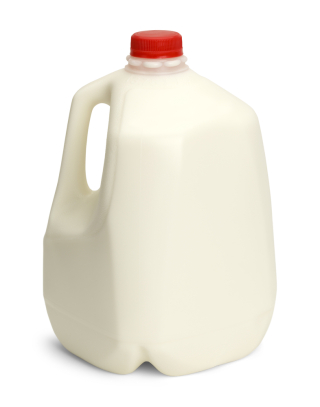
Milk
Milk is… wait for it… LegenDAIRY! It is one of the oldest consumed beverages and is valued as the “food of the gods” by ancient Greeks. Here are some reasons why milk has been enjoyed throughout the world for thousands of years:
- Be Healthier:
Milk is nutrient-rich and is packed with important nutrients like calcium, phosphorus, B vitamins, potassium and vitamin D. Drinking milk is important for bone health and may prevent osteoporosis and bone fractures.
- Better Sports Performance:
Research suggests that fat free milk is as effective as, and possibly even more effective than, sports drinks at promoting recovery from strength and endurance exercise. Also milk also has the added benefit of providing additional nutrients and vitamins that are not present in commercial sports drinks.
Although milk may be a good choice for some, others can’t digest it or choose not to consume it. If this is the case for you, do not worry as many of the essential nutrients found in milk can also be found in a variety of plant foods.

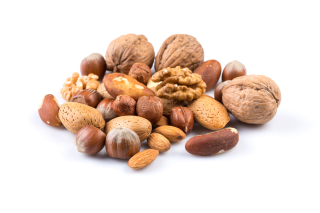
Nuts
Go NUTS for nuts! Did you know Walnuts are the oldest known tree food — they date all the way back to 10,000 BC. So not only have Nuts passed the test of time, they also have heaps of benefits including:
- Be Healthier:
Nuts are a great source of healthy fats (monounsaturated and polyunsaturated fats) which are essential for regulating blood cholesterol and improving heart health. In a review of 25 intervention trials, eating approximately 67g of nuts a day (about half a cup) led to a 5.1% reduction in total cholesterol and 7.4% for LDL (bad cholesterol). Eating nuts regularly has also shown to reduce risk of heart disease, reduce overall mortality and reduce risk of developing type 2 diabetes.
- Better Sports Performance:
Nuts are high in protein which can provide amino acids for the maintenance and repair of muscle protein after strenuous exercise to help with a quicker recovery.
- Healthy Gut:
As a good source of fibre nuts are essential for a healthy bowel function.
- Feel Fuller for Longer:
Although nuts are high in kilojoules, research in over 120,000 healthy men and women, found that eating nuts meant they were less likely to gain weight over the four years studied. The combination of protein, fibre and healthy fats help satisfy the appetite and help in weight management.
Almonds, Brazil nuts, cashews, chestnuts, hazelnuts, macadamias, pecans, pine nuts, pistachios and walnuts are all nuts that are packed full of beneficial nutrients for good health. So next time you’re peckish, maybe grab a bag of nuts.


Pineapple
Pineapples are not only a pizza topping, they are a delicious and refreshing tropical fruit which have been linked to many health benefits including:
- Be Healthier:
Pineapples are high in phytonutrients (especially Vitamin C and Manganese) which help in protecting against cancer and Heart disease.
- Better Sports Performance:
Strenuous exercise can cause inflammation and result in muscle soreness for up to 3 days. But research has shown that the nutrient Bromelain in pineapples may reduce this inflammation and speed up recovery from the damage caused by exercise.
- Support Immune Function:
Pineapples are loaded with vitamin C to help with wound healing and fighting infection.
To get some more pineapple in your diet, why not add it to a smoothie for breakfast, or in a salad with roast chicken, or in a dessert as a delicious fruit salad?

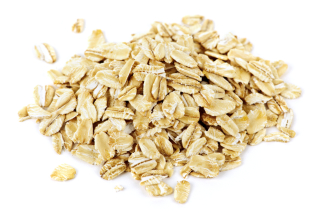
Rolled Oats
Did you know that oats have their very own special day? October 29th is National Oatmeal Day in the US. So in celebration of this magnificent grain, we’ here to tell you all about its many benefits:
- Be Healthier:
Regularly eating oats is important for heart health as research has shown oats reduce your blood pressure, your total cholesterol and LDL (bad) cholesterol.
- Sharper Thinking:
Oats supply a sustained energy source to the brain, which may help people to learn better. A study of school children showed that those who ate oatmeal before school performed significantly better on spatial memory and auditory learning tasks than those who ate a sugar cereal.
- Better Sports Performance:
Oats have a Glycaemic Index of around 50 which is considered as a low GI carbohydrate. This means that when they are digested the carbohydrates in them are absorbed slowly, resulting in a gradual release of glucose into the blood which helps to improve overall endurance and running capacity.
- More Energy:
Oats are a carbohydrate which breaks down slowly to gradually release glucose into the bloodstream, this give you a longer-lasting energy boost throughout the day. Oats are absorbed slower, giving you a longer-lasting boost throughout the day. Oats also contain B vitamins like Niacin and Thiamin, which work together to help your body convert carbohydrates into energy.
- Feel Fuller for Longer:
As a Low GI carbohydrate, oats help to prolong digestion due to their slow break down and may help with satiety (feeling full).
Celebrate National Oatmeal day everyday by enjoying oats for breakfast (as porridge or in muesli). And there’s an added bonus – they’re cheap, at $4 to $5 a kilogram!

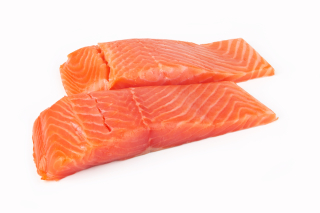
Salmon
Salmon is high in fat and has almost double the fat content of a lean steak. But don’t avoid this fatty fish because salmon contains highly specific healthy fats called omega-3s, which are components of every cell membrane in your body. Salmon is also an excellent source of B vitamins, with a number of health benefits including:
- Be Healthier:
Salmon is high in healthy polyunsaturated fatty acids called omega-3s (1.7 grams per 100 grams fish) and omega-6 (170 milligrams per 100 grams of fish). Research shows these are important to regulate important body functions, including blood pressure, blood clotting, the brain and nervous system, and the production of molecules that regulate the inflammatory response.
- Sharper Thinking:
Salmon is an excellent source of several B vitamins, which are essential for optimal brain health and functioning.
- Better Sports Performance:
Your body requires protein to heal and recover after exercise. Salmon is a good source of protein (salmon provides 24 grams of protein per 100 grams serve) which can provide amino acids for the maintenance and repair of muscle protein after strenuous exercise to help with a quicker recovery.
So make sure to get this fatty fish on the menu every week!

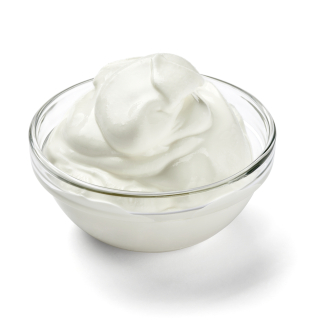
Yoghurt
Yoghurt is Turkish for “curdled” or “thickened milk”. It is one of the oldest fermented dairy foods and is a rich source of calcium and protein. It also contains other nutrients such as iodine, vitamins D, B2 and B12, and zinc. Here are some of the impressive health benefits of yoghurt:
- Be Healthier:
Yoghurt is important for overall health. Research has linked yoghurt consumption with gastrointestinal tract health, bone health and prevention of metabolic syndrome, diabetes and heart disease.
- Better Sports Performance:
Yoghurt is a good source of protein which can provide amino acids for the maintenance and repair of muscle protein after strenuous exercise to help with a quicker recovery.
- Healthy Gut:
Consuming yoghurt can help maintaining a healthy microbiota (the colony of bacteria in your gut). Also some types of probiotics in yoghurt have been shown to improve digestive health.
There are many different types of yoghurt – plain, Greek, low-fat etc but which is healthiest? Check out this 2-min read to find out.

